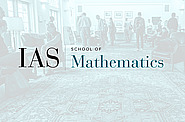Seminars
Feb
24
2014
Computer Science/Discrete Mathematics Seminar I
An Almost-Linear-Time Algorithm for Approximate Max Flow in Undirected Graphs, and its Multicommodity Generalizations
11:15am|S-101
Feb
18
2014
Computer Science/Discrete Mathematics Seminar II
Non-commutative arithmetic computation
10:30am|S-101
Feb
17
2014
Computer Science/Discrete Mathematics Seminar I
Unifying known lower bounds via geometric complexity theory
Joshua Grochow
11:15am|S-101
Feb
11
2014
Computer Science/Discrete Mathematics Seminar II
Non-commutative arithmetic computation
10:30am|S-101
Feb
10
2014
Computer Science/Discrete Mathematics Seminar I
Polynomial Bounds for the Grid-Minor Theorem
11:15am|S-101
Feb
04
2014
Feb
03
2014
Computer Science/Discrete Mathematics Seminar I
Local Correctability of Expander Codes
Brett Hemenway
11:15am|S-101
Jan
28
2014
Jan
27
2014
Computer Science/Discrete Mathematics Seminar I
Unique games, the Lasserre hierarchy and monogamy of entanglement
Aram Harrow
11:15am|S-101
Jan
21
2014
Computer Science/Discrete Mathematics Seminar II
Deeper Combinatorial Lower Bounds
Siu Man Chan
10:30am|S-101
